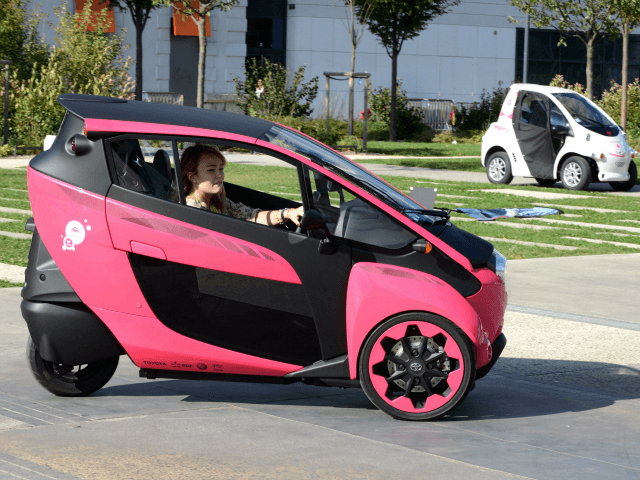No one wants to buy electric cars.
Americans bought just 102,600 such vehicles in 2015, a 17 percent decline from the previous year, according to researcher Autodata. Nissan Motor Co. sold 43 percent fewer of its all-electric Leaf and General Motors Co. reported an 18 percent drop for its Chevrolet Volt, a plug-in model that’s driven by an electric motor and has a gasoline engine to recharge its batteries.
And who can blame them?
Apart from being poky and tinny and smug and expensive and utterly useless for long distances, electric cars are also terrible for health and the environment, as even environmentalist Bill Gates has recognised:
People think, Oh, well, I’ll just get an electric car. There are places where if you buy an electric car, you’re actually increasing CO2 emissions, because the electricity infrastructure is emitting more CO2 than you would have if you’d had a gasoline-powered car.
Electric cars, in other words, are the motoring equivalent of a neon sign saying: “I am a total wanker.” Which is why everyone who is not a total wanker prefers gasoline-powered vehicles. With the oil price so low – and looking to stay low for some considerable time yet – it makes perfect sense.
Since gas prices have been declining for a year now, and the national price of a gallon of unleaded is about $1.97 at the moment, Americans just aren’t making fuel-efficiency a priority with their new car choices. The biggest winners in 2015’s record-breaking new car-a-palooza were Jeep, Ram and any brand with a lot of SUVs, trucks and crossovers.
In Britain, it’s just the same. Not only are consumers shunning electric cars but they are gravitating towards bigger, gas-guzzling cars which they might previously have considered impractical. I’m one of them. When the lease on my diesel-powered Skoda runs out, I’m almost certainly going to buy a big, chunky, 4 x 4 like, maybe, a second-hand LandRover Discovery. If, as I do, you live in the remote country and you need to drive very fast so as to ensure the milk doesn’t go sour on the epic journey back from the supermarket, then clearly it’s very important that if you smash into an obstacle – a muntjac deer, say; or a gang of Romanians who’ve just pinched the lead off your church roof; or a Prius driver on their way to save a sett of tubercular badgers – you do so with minimum damage to your own vehicle.
That’s what God is trying to tell us through the medium of low oil prices: that a) He absolutely loathes the Middle East and everyone in it (apart from the Israelis, obviously, who are His Chosen People) and b) that He is sick to death of bleeding heart mimsers who take weird pride in the tinny crapness of their eco-cars and that He wants them all to die.
Even if it isn’t what God wants, though, it’s definitely what the free market is telling us. This is the glory of the untrammelled economic system: it is the collective product of million upon million voluntary decisions by free individuals based on informed calculations. No economist, no government functionary could ever replicate this system through management or regulation because they could never hope to gain access to the complex and ever-changing data which informs all these consumer decisions.
But that’s never going to stop our political leaders trying, is it?
Obama, who has staked his presidency on his environmental record, is doing everything to push electric cars short of making them compulsory.
In his 2011 State of the Union Address, Obama renewed a call he made as a candidate in 2008 to get 1 million plug-in electric vehicles (EVs) on the road by 2015. But sales have been far slower than expected – only about 490,000 vehicles, including 115,000 in 2015, down 6 percent from 2014. Automakers have been forced to cut EV prices and sales forecasts.
The UK government shares Obama’s delusions:
Ministers see electric vehicles as key to decarbonising the UK’s transport sector, and meeting the Climate Change Act 2008 target for an 80% reduction in greenhouse gases against 1990 levels by 2050.
In recent advice to ministers on the fifth carbon budget (2028-2032), the Committee on Climate Change (CCC) says that, under a central scenario, plug-in hybrids and battery electric vehicles should account for 9% of UK new car and van sales by 2020 and around 60% by 2030.
But an automotive firm has told the CCC that manufacturers are currently selling electric cars at a loss and the market is failing to grow in the way some forecasts predicted.
So we’re caught between a rock and a hard place. On the one hand consumers are sending a very clear signal to the markets: “We don’t want electric cars. They’re boring, they’re stupid, they suck.” On the other hand the dead hand of the State – from the Obama administration to the nations of the EU and, perhaps most especially, the People’s Green Socialist Republic of California – is using every available tool from bribes and incentives (eg free parking and taxpayer funded charge points for electric cars) to regulations and mandates to force this unwanted and unnecessary technology on consumers regardless.
In California, for example, by 2020 10 percent of all vehicle sales must be EV or fuel cell cars; while nationally fleets must average 54.5 mpg by 2025. (Currently we’re at 24.7 mpg).
Now imagine if the entire basis of this enforced drive to electric depended on the erroneous beliefs that oil was running out and that we needed to cut our carbon emissions to prevent catastrophic global warming.
Imagine just how disgusted and rebellious we’d feel then…

COMMENTS
Please let us know if you're having issues with commenting.